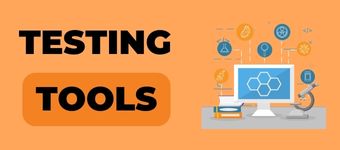Testing Tools: Empowering Developers, Ensuring Excellence
Software testing is a fundamental part of the software development lifecycle, ensuring the appropriate working of the applications and their compliance with predefined quality standards. In today’s rapidly evolving technological landscape, the use of testing tools has become increasingly prevalent, enabling organizations to streamline their testing processes, improve efficiency, and enhance the overall quality of their software products. This blog post examines the domain of testing tools, outlining the advantages, industry benchmarks, and average salaries, with the final summary section.
What is software testing?
Software testing is a well-structured process of checking and confirming the function of a software application or system that it meets specific requirements and performs accurately. As the Software development life cycle (SDLC) is distinct, it plays the important role of identifying any defects, errors, or bugs before the software is made public.
There are various types of testing, including unit testing, where individual components or modules are tested in isolation; integration testing, which examines how different modules work together; system testing, which evaluates the entire system’s functionality; and acceptance testing, which ensures the software meets the user’s requirements.
Testing can be conducted manually or automated, with automated testing becoming increasingly prevalent due to its efficiency and repeatability. Testers create test cases based on requirements, design, and user scenarios, then execute them to uncover defects.
The goal of software testing is not only to identify bugs but also to ensure the software is reliable, scalable, and user-friendly. It helps mitigate risks associated with software failures, enhances user experience, and ultimately contributes to the overall success of the software development process.

Different types of testing tools
Testing tools come in various types, each catering to specific aspects of the software testing process. Here’s an overview of different kinds of testing tools and their types:
- Functional Testing Tools
These tools are used to validate the functional aspects of software applications, including user interface behavior, functionality, and integration. Eg: Selenium, HP UFT, IBM Rational Functional Tester.
- Performance Testing Tools
Performance testing tools assess the responsiveness, scalability, and stability of applications under varying load conditions. Eg: JMeter, LoadRunner, Apache Bench.
- Security Testing Tools
Security testing tools help identify vulnerabilities and weaknesses in software systems, ensuring the confidentiality, integrity, and availability of sensitive information. Eg: OWASP ZAP, Burp Suite, Nessus.
- API Testing Tools
API testing tools focus on testing the functionality, reliability, and performance of application programming interfaces (APIs). Eg: Postman, SoapUI, REST Assured.
- Load Testing Tools
Load testing tools simulate high levels of user activity to assess how an application behaves under heavy loads. Eg: Apache JMeter, LoadRunner, Gatling.
- Mobile Testing Tools
Mobile testing tools are specifically designed to test mobile applications across different devices, platforms, and network conditions. Eg: Appium, TestComplete, Selendroid.
- Code Analysis Tools
Code analysis tools analyze source code to identify potential issues, improve code quality, and ensure compliance with coding standards. Eg: SonarQube, Checkmarx, Coverity.
These are just some of the categories and types of testing tools available, each serving a specific purpose in the software testing lifecycle. Depending on the requirements of a project, testing professionals choose the appropriate tools to ensure comprehensive testing coverage and the delivery of high-quality software products.
Advantages of using Testing Tools
- Increased Efficiency and Productivity: Testing tools automate repetitive and time-consuming tasks, allowing testers to focus on more complex and challenging aspects of testing. This automation not only saves time but also reduces the likelihood of human error, leading to improved productivity and faster time-to-market.
- Comprehensive Test Coverage: Testing tools provide a wide range of features and functionalities that enable comprehensive test coverage, including functional testing, performance testing, security testing, and more. By leveraging these tools, organizations can ensure that their software applications are thoroughly tested across various scenarios and environments.
- Reusability and Scalability: Many testing tools support the creation and execution of reusable test scripts, enabling testers to build and maintain a robust test suite that can be easily scaled and adapted to changing requirements or application updates.
- Reporting and Analytics: Testing tools often include robust reporting and analytics capabilities, providing valuable insights into test results, defect trends, and overall project health. These insights enable organizations to make data-driven decisions and continuously improve their testing processes.
Average Salaries in the Testing Tools Industry
The salary for testing tool engineers can vary based on factors such as experience, skills, location, and the specific company they work for.
Entry-level testing tool engineers in India can expect to earn an average annual salary ranging from ₹300,000 to ₹600,000. With a few years of experience, mid-level engineers can earn between ₹600,000 to ₹1,200,000 per year. Senior testing tool engineers with extensive experience and expertise may earn salaries ranging from ₹1,200,000 to ₹2,500,000 or more annually.
These figures are approximate and can vary based on various factors such as the city (with metropolitan areas often offering higher salaries), the specific industry (such as IT, finance, or manufacturing), and the demand for testing tool engineers in that region.
It’s essential to keep in mind that these figures are based on general trends and may not represent the exact salary you could expect. It’s always a good idea to research salary data specific to your location and industry or consult with professionals in the field for more accurate information.
Where you can learn testing tools
If you’re searching for Testing tools training near you, our online learning options allow you to access our courses from anywhere, at any time. we offer convenient Testing online training in Hyderabad. At V Cube, we understand the importance of flexibility in education. That’s why we offer both traditional classroom-based instruction and convenient online learning options.
Whether you’re a beginner looking to start your career in software testing or an experienced professional seeking to upskill, V cube Software Solutions offers the Best testing tools training in Hyderabad. Some of the institutes in Hyderabad ensure that students not only gain expertise in Software Testing Tools but also receive placement assistance in Hyderabad.
Our Automation testing tools training in Hyderabad goes beyond manual testing, teaching you how to leverage automation tools like Selenium for efficient and effective testing. Testing tools Training encompasses various aspects of software testing, including manual testing, automation testing, Selenium test automation, and API testing.
Conclusion
Testing tools have become an indispensable component of the software development landscape, offering organizations numerous advantages, including increased efficiency, comprehensive test coverage, reusability, and valuable reporting and analytics capabilities. As the industry continues to evolve, trends such as the shift towards Agile and DevOps methodologies, the integration of AI and ML technologies, cloud-based testing solutions, and the emphasis on exploratory testing are shaping the future of testing tools.
The demand for skilled professionals in the testing tools industry remains high, with competitive salaries reflecting the value placed on their expertise. Software test engineers, test automation engineers, QA leads/managers, and performance test engineers are among the key roles commanding respectable average salaries in this field.
As software applications continue to permeate every aspect of our lives, the importance of robust and efficient testing tools cannot be overstated. By leveraging these tools and staying ahead of industry trends, organizations can ensure the delivery of high-quality software products that meet the ever-increasing expectations of end-users.


